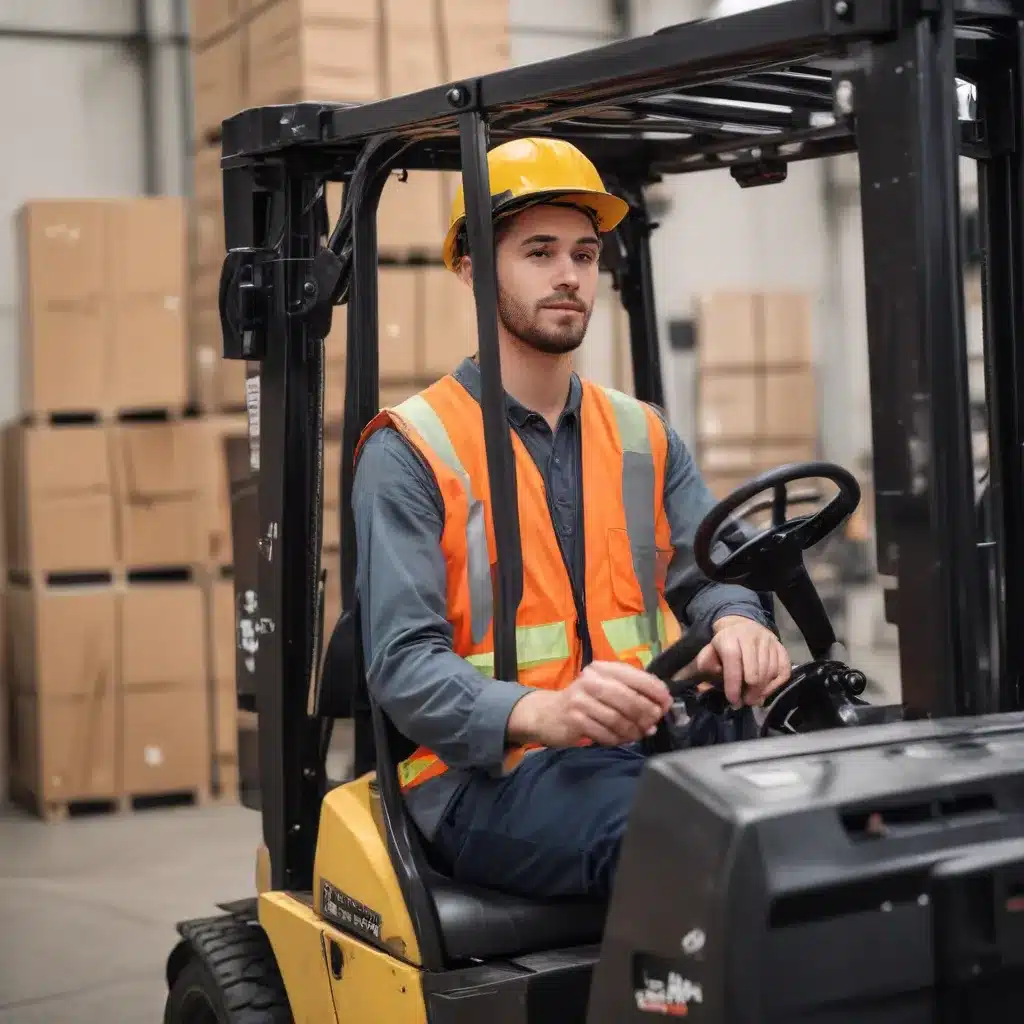
The Importance of Emotional Intelligence for Forklift Operators
As a seasoned industry expert in forklifts, warehousing, and logistics, I’ve witnessed firsthand the critical role that emotional intelligence (EQ) plays in the success and safety of forklift operations. Forklift operators are not only required to navigate complex machinery and master technical skills, but they must also navigate the interpersonal dynamics of the warehouse environment, effectively communicate with team members, and demonstrate strong leadership qualities.
In today’s fast-paced, high-pressure warehousing and logistics industry, emotional intelligence has emerged as a key differentiator between good forklift operators and great ones. Forklift operators with strong EQ are better equipped to handle the stresses of the job, build trust with their colleagues, and make quick, level-headed decisions that prioritize safety and efficiency.
Defining Emotional Intelligence for Forklift Operators
Emotional intelligence, as defined by Daniel Goleman, is the ability to recognize, understand, manage, and reason with emotions. For forklift operators, this translates to several key competencies:
-
Self-Awareness: The ability to accurately assess their own emotional state, strengths, and weaknesses, and how these impact their behavior and decision-making.
-
Self-Regulation: The capacity to control impulsive reactions, manage stress, and adapt their approach to different situations.
-
Empathy: The skill to understand and respond to the emotions and perspectives of their team members, supervisors, and other stakeholders.
-
Social Skills: The proficiency to communicate effectively, build strong relationships, and resolve conflicts in a constructive manner.
-
Motivation: The drive to continuously improve, take on new challenges, and contribute to the overall success of the organization.
By developing these emotional intelligence capabilities, forklift operators can not only enhance their own performance but also positively influence the dynamics of their entire team, fostering a culture of trust, collaboration, and safety.
The Impact of Emotional Intelligence on Forklift Operations
The benefits of emotional intelligence training for forklift operators are far-reaching, impacting both individual and organizational outcomes:
Improved Safety and Risk Management
Forklift operators with strong emotional intelligence are better equipped to remain calm under pressure, make sound decisions, and prioritize safety protocols, even in high-stress situations. By managing their own emotions and understanding the emotional states of their colleagues, they can anticipate and mitigate potential safety risks, leading to a reduction in accidents and costly downtime.
Enhanced Productivity and Efficiency
Emotionally intelligent forklift operators are adept at building strong working relationships with their team members, fostering open communication, and collaborating effectively. This, in turn, leads to improved coordination, reduced errors, and a more streamlined workflow, ultimately boosting overall productivity and efficiency in the warehouse.
Improved Employee Engagement and Retention
Forklift operators who demonstrate emotional intelligence are often viewed as approachable leaders, capable of motivating and inspiring their colleagues. By fostering a positive, supportive work environment, these operators can contribute to higher employee engagement, reduced turnover, and a more stable, experienced workforce.
Stronger Adaptability and Change Management
In an industry that is constantly evolving, forklift operators with strong emotional intelligence are better equipped to navigate change, adapt to new processes, and embrace continuous improvement initiatives. Their ability to regulate their own emotions and empathize with the concerns of their team members can facilitate smoother transitions and a more resilient workforce.
Implementing Emotional Intelligence Training for Forklift Operators
To unlock the full potential of emotional intelligence within your forklift operations, consider implementing a comprehensive training program that addresses the key competencies identified earlier. This training can take various forms, from classroom-based workshops to hands-on simulations and one-on-one coaching.
Classroom-Based Workshops
Classroom-based workshops can provide forklift operators with a solid foundation in emotional intelligence principles, offering opportunities for self-assessment, group discussions, and the development of practical strategies for applying these skills in the workplace. These workshops can cover topics such as:
- Understanding emotional intelligence and its relevance to forklift operations
- Developing self-awareness and regulating emotions
- Building empathy and effective communication skills
- Resolving conflicts and navigating challenging interpersonal situations
- Cultivating a positive, collaborative work environment
Hands-On Simulations
Complementing the classroom-based approach, hands-on simulations can offer forklift operators the chance to apply their emotional intelligence skills in a controlled, real-world environment. These simulations can include:
- Scenario-based exercises that challenge operators to make decisions under pressure while managing their emotions and those of their team members
- Role-playing activities that allow operators to practice effective communication, conflict resolution, and leadership skills
- Forklift operation simulations that incorporate emotional intelligence elements, such as responding to unexpected events or managing team dynamics
One-on-One Coaching
For a more personalized approach, one-on-one coaching sessions can provide forklift operators with individualized support and guidance in developing their emotional intelligence capabilities. These coaching sessions can help operators:
- Identify their unique strengths and areas for improvement
- Create tailored action plans for enhancing their emotional intelligence skills
- Receive ongoing feedback and support in implementing new strategies
- Receive guidance on navigating specific interpersonal challenges they may be facing
By investing in comprehensive emotional intelligence training, forklift operators can enhance their leadership capabilities, improve safety and efficiency, and contribute to the overall success of your warehousing and logistics operations.
Conclusion: Unlocking the Full Potential of Forklift Operators
In the high-stakes world of forklift operations, emotional intelligence is no longer a nice-to-have, but a critical skill set that can make the difference between good and great performance. By providing forklift operators with the tools and support to develop their emotional intelligence, organizations can foster a culture of trust, collaboration, and continuous improvement, ultimately driving long-term success in the ever-evolving warehousing and logistics industry.
Remember, as a seasoned industry expert, I’m always here to provide practical tips, in-depth insights, and the latest trends to help you and your team of forklift operators reach new heights of safety, efficiency, and leadership. Feel free to explore Forklift Reviews for more valuable resources and connect with me directly for any additional guidance or support.

